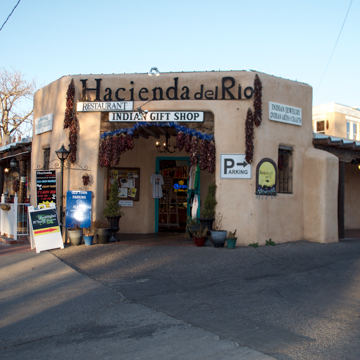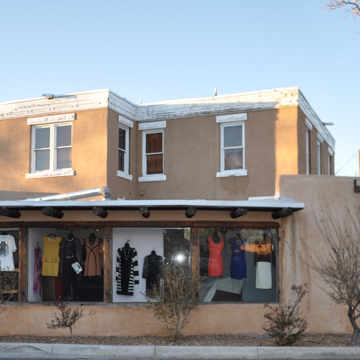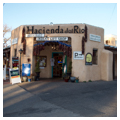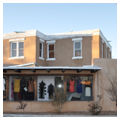You are here
Hacienda del Rio Restaurant
Built on the plaza’s northeast corner for the entrepreneur and market gardener Herman Blueher, the house was erected atop the ruins of an adobe hacienda on Blueher’s twenty-acre farm at the northeast edge of Old Town. Extensively remodeled in the 1950s, the building reflects Old Town’s postwar reinvention as a tourist district in the Spanish Colonial Revival style. Adopting the Queen Anne Style imported to New Mexico by the railroad, the original, two-story brick structure had a high-hipped roof, projecting gable dormers, and porches on both floors. When Old Town was redefined as a tourist destination and remade in the Spanish Colonial Revival style after World War II, the Blueher house was adapted for use as a restaurant and remodeled. Its roof and porches were removed, its brickwork covered with stucco to imitate adobe, and a portico with rough-hewn posts and beams, corbel bracket capitals, projecting vigas and a ceiling of latillas was added around two sides. Stripped of its details, the original house nonetheless remains visible at the back. The adjacent structures of adobe and wood, now occupied by shops, were part of Blueher’s farm.
References
DeWitt, Susan. Historic Albuquerque Today: An Overview Survey of Historic Buildings and Districts. 2nd ed. Albuquerque, NM: Historic Landmarks Survey of Albuquerque, 1978.
DeWitt, Susan, “Old Albuquerque Historic District,” Bernalillo County, New Mexico. National Register of Historic Places Inventory–Nomination Form, 1980. National Park Service, U.S. Department of the Interior, Washington, D.C.
Johnson, Byron A. Old Town, Albuquerque, New Mexico: A Guide to Its History and Architecture. Albuquerque, NM: City of Albuquerque, 1980.
Writing Credits
If SAH Archipedia has been useful to you, please consider supporting it.
SAH Archipedia tells the story of the United States through its buildings, landscapes, and cities. This freely available resource empowers the public with authoritative knowledge that deepens their understanding and appreciation of the built environment. But the Society of Architectural Historians, which created SAH Archipedia with University of Virginia Press, needs your support to maintain the high-caliber research, writing, photography, cartography, editing, design, and programming that make SAH Archipedia a trusted online resource available to all who value the history of place, heritage tourism, and learning.























